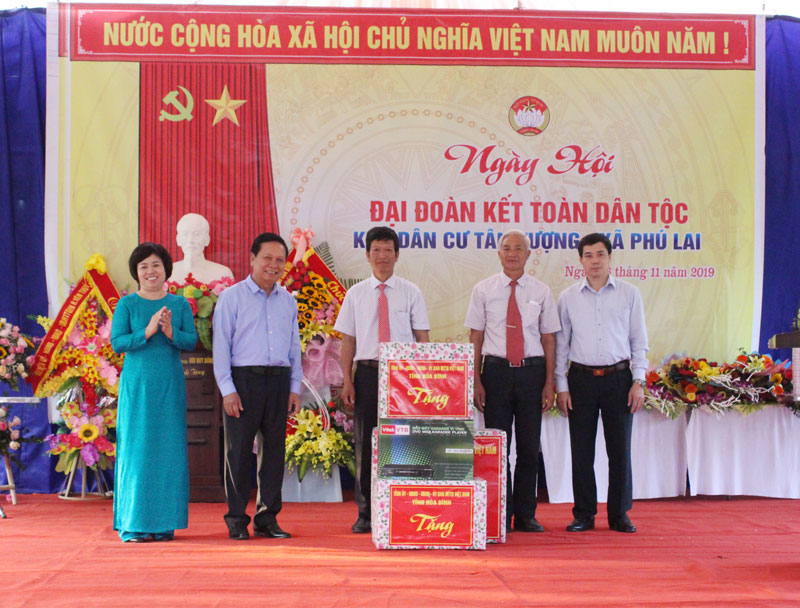
(HBO) – Tan Vuong hamlet in Yen Thuy district’s Phu Lai commune on November 6 organised the great national unity festival to celebrate 89th anniversary of the National United Front of Vietnam (November 18). The event was attended by member of the Party Central Committee and Secretary of the provincial Party Committee Bui Van Tinh, and leaders from competent authorities.
 Member of the Party
Central Committee and Secretary of the provincial Party Committee Bui Van Tinh
and members of the provincial standing board present gifts to and congratulate
Tan Vuong hamlet’s residents.
Member of the Party
Central Committee and Secretary of the provincial Party Committee Bui Van Tinh
and members of the provincial standing board present gifts to and congratulate
Tan Vuong hamlet’s residents.
As
a new hamlet, Tan Vuong was merged from Tan hamlet and Phu Vuong hamlet in
2019. Currently, Tan Vuong has 221 households with 768 residents, 60 percent of
whom are ethnic minority people.
In the past years, the hamlet officials and local residents have worked to
promote solidarity and attained significant achievements in socio-economic
development. This year, income per capita is estimated at 32.1 million VND
while the poverty rate is forecast to drop to 4.52 percent. There is no hunger
family and no dilapidated houses in the hamlet.
Besides economic development, local residents have worked together to
effectively carry out the campaign "All people join hands to build new-style
rural area and civilised urban area”.
Next year, Tan Vuong targets income per capita from 35 million VND, and the rate
of impoverished households under 3 percent. Meanwhile, it also sets a target to
have 93 percent of households meeting the standard of culture family.
Speaking at the event, Secretary of the provincial Party Committee Bui Van Tinh
congratulated and hailed the hamlet for its achievements, expressing his belief
that by promoting solidarity spirit together with local traditions, Tan Vuong
people will reap further success, contributing to the development of Yen Thuy
district.
On the occasion, Tinh presented 20 gifts to 10 outstanding families and 10
households with specially difficult economic circumstance.
The People’s Committee of Phu Lai commune praised and presented gifts to
organisations, households and individuals who had excellent performance in
building "culture family” and the community./.
With an increasingly vibrant and widespread emulation movement aimed at building cultured residential areas and cultured families, Yen Thuy District has been making steady progress toward improving both the material and spiritual well-being of its people, while fostering a civilized, prosperous, beautiful, and progressive community.
Once lacking recreational spaces and community facilities, Residential Group 2 in Quynh Lam Ward (Hoa Binh City) has recently received attention for the construction of a new, spacious, and fully equipped cultural house. The project followed the model of state support combined with public contributions in both labor and funding.
The "All people unite to build cultural life" movement, which has been effectively integrated with Kim Boi district’s socio-economic development goals, is fostering a lively spirit of emulation across local residential areas, hamlets, villages, public agencies, and enterprises. In addition, through the initiative, traditional cultural values are being preserved and promoted, while community solidarity and mutual support in poverty reduction and economic development are being strengthened.
A working delegation of the Hoa Binh provincial People’s Committee led by its Permanent Vice Chairman Nguyen Van Toan on June 11 inspected the progress of a project to build the Mo Muong Cultural Heritage Conservation Space linked to tourism services in Hop Phong commune, Cao Phong district.
Born and growing in the heroic land of Muong Dong, Dinh Thi Kieu Dung, a resident in Bo town of Kim Boi district, in her childhood was nurtured by the sweet lullabies of her grandmother and mother. These melodies deeply imprinted on her soul, becoming an inseparable part of her love for her ethnic group's culture. For over 20 years, this love for her hometown has driven Dung to research, collect, and pass down the cultural values of the Muong people to future generations.
In the final days of May, the Ethnic Art Troupe of Hoa Binh Province organized performances to serve the people in remote, mountainous, and particularly disadvantaged areas within the province. These were not just ordinary artistic shows, but they were the meaningful journeys aimed at spreading cultural values, enhancing the spiritual life of the people and contributing to the preservation of ethnic minority cultural identities.



 Member of the Party
Central Committee and Secretary of the provincial Party Committee Bui Van Tinh
and members of the provincial standing board present gifts to and congratulate
Tan Vuong hamlet’s residents.
Member of the Party
Central Committee and Secretary of the provincial Party Committee Bui Van Tinh
and members of the provincial standing board present gifts to and congratulate
Tan Vuong hamlet’s residents.